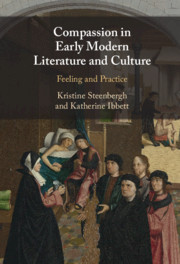Book contents
- Compassion in Early Modern Literature and Culture
- Compassion in Early Modern Literature and Culture
- Copyright page
- Contents
- Acknowledgements
- Contributors
- Introduction
- Part I Theorising
- Part II Consoling
- Chapter 3 ‘Hee Left Them Not Comfortlesse By the Way’
- Chapter 4 Friendship, Counsel and Compassion in Early Modern Medical Thought
- Part III Exhorting
- Part IV Performing
- Part V Responding
- Part VI Giving
- Part VII Racialising
- Part VIII Contemporary Compassions
- Index
Chapter 4 - Friendship, Counsel and Compassion in Early Modern Medical Thought
from Part II - Consoling
Published online by Cambridge University Press: 23 April 2021
- Compassion in Early Modern Literature and Culture
- Compassion in Early Modern Literature and Culture
- Copyright page
- Contents
- Acknowledgements
- Contributors
- Introduction
- Part I Theorising
- Part II Consoling
- Chapter 3 ‘Hee Left Them Not Comfortlesse By the Way’
- Chapter 4 Friendship, Counsel and Compassion in Early Modern Medical Thought
- Part III Exhorting
- Part IV Performing
- Part V Responding
- Part VI Giving
- Part VII Racialising
- Part VIII Contemporary Compassions
- Index
Summary
Stephen Pender explores the confected relationship between counsel, compassion and friendship – in doctor-patient relationships, in conceptions of ideal physicians as virtuous friends – in medical thought between c. 1500 and 1780. How does compassion condition bedside counsel as well as strictures about ideal medical practice? What inspires confidence in a physician at the bedside? What engenders trust and ‘friendship’? Drawing on early modern English texts, Pender argues that conversations between physicians and patients were characterised by trust and compassion, and offers several instances in which friendship is advanced as a framework, a structure of feeling, for exploring vulnerability, suffering, physical and psychic distemper. From antiquity on, ideal physicians and true friends shared virtue, care, timeliness, moderate candour; portraits of friends borrowed medical metaphors, while physicians mobilised the qualities of friendship to aid, and to describe, their care.
- Type
- Chapter
- Information
- Compassion in Early Modern Literature and CultureFeeling and Practice, pp. 82 - 100Publisher: Cambridge University PressPrint publication year: 2021

